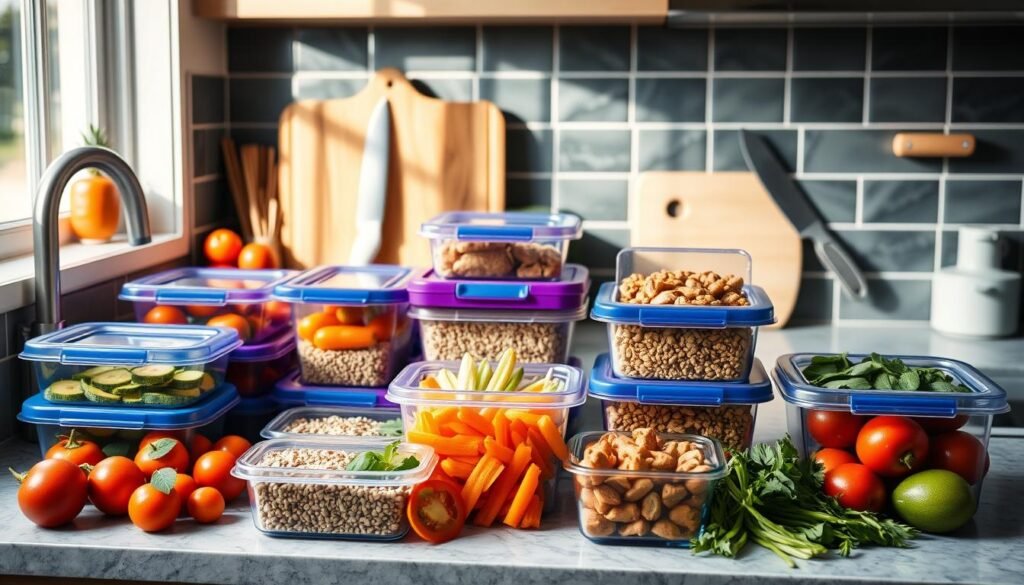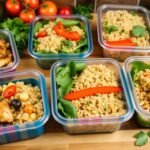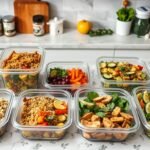Have you ever found yourself scrambling to put together a healthy, home-cooked meal at the end of a long day? If so, you’re not alone. Meal prepping has become a game-changer for busy individuals who want to save time, eat better, and reduce food waste. But what exactly is meal prepping, and how can it benefit your lifestyle? Let’s dive in and explore the world of meal prep for beginners.
Key Takeaways
- Meal prepping is the practice of planning and preparing meals in advance to save time and reduce stress during the week.
- Meal prep can help you eat healthier, save money, and reduce food waste by portioning out meals and snacks.
- Beginners can start with simple meal prep techniques like batch cooking, freezing meals, and using meal prep containers.
- Meal prep recipes can be customized to your dietary needs and preferences, from breakfast to dinner.
- Meal prepping takes some time upfront, but can save you hours throughout the week.
Are you ready to take control of your meals and start reaping the benefits of meal prepping? Let’s explore the concept in more detail and uncover the essential tips and recipes for beginner meal preppers.
What is Meal Prepping?
Meal prepping is the art of preparing meals or key components of meals in advance, often on a weekly basis. This smart approach to meal planning allows you to have healthy, delicious food at the ready whenever hunger strikes. By meal prepping, you can save time, reduce food waste, and make it easier to stick to your dietary goals.
Understanding the Concept
At its core, meal prepping is all about planning and preparing your meals ahead of time. This can involve anything from chopping and roasting vegetables to cooking a batch of grains or preparing an entire recipe in advance. The goal is to have the building blocks of your meals ready to go, so all you have to do is assemble and reheat when it’s time to eat.
The advantages of meal prepping are numerous. It can help you save time on busy weeknights, reduce food waste, and ensure you have access to healthy, balanced meals throughout the week. By taking some time on the weekend or a designated meal prep day, you can set yourself up for success and avoid the temptation of ordering takeout or reaching for less nutritious options.
“Meal prepping is a game-changer for busy people who want to eat well without the hassle.”
Whether you’re a seasoned cook or just starting to explore the world of meal prep, understanding the basic concept can help you unlock a world of culinary convenience and healthier eating habits.
Benefits of Meal Prepping
Meal prepping can be a game-changer when it comes to maintaining a healthy lifestyle. By dedicating a bit of time to plan and prepare your meals in advance, you can enjoy a host of benefits that make your life easier and more nutritious. Let’s explore some of the key advantages of meal prepping.
First and foremost, meal prepping saves you time. Instead of scrambling to put together a meal every day, you can have healthy, home-cooked options readily available. This means less time spent in the kitchen and more time for the activities you love.
Secondly, meal prepping can help you save money. When you have a plan and prepare your meals ahead of time, you’re less likely to order expensive takeout or eat out, which can quickly add up. By buying in bulk and utilizing leftovers, you can stretch your food budget further.
Another significant benefit of meal prepping is improved healthy eating. With pre-made meals at the ready, you’re less tempted to reach for unhealthy snacks or convenience foods. You can ensure that your meals are balanced, nutritious, and tailored to your dietary needs, making it easier to stick to your health goals.
Finally, meal prepping can reduce food waste. By planning your meals and using up perishable ingredients, you’re less likely to let food go to waste in the back of your fridge or pantry. This not only saves you money but also helps minimize your environmental impact.
| Benefit | Description |
|---|---|
| Time Savings | Meal prepping allows you to have healthy, home-cooked meals readily available, reducing the time spent in the kitchen each day. |
| Cost Savings | By planning and preparing meals in advance, you’re less likely to order expensive takeout or eat out, helping you stretch your food budget further. |
| Healthier Eating | With pre-made meals on hand, you can ensure that your meals are balanced, nutritious, and tailored to your dietary needs, making it easier to stick to your health goals. |
| Reduced Food Waste | Meal prepping helps minimize food waste by using up perishable ingredients and planning meals in advance, saving you money and reducing your environmental impact. |
As you can see, the benefits of meal prepping are numerous and can have a positive impact on your overall well-being. By taking the time to plan and prepare your meals, you can enjoy the advantages of meal prep and make healthier choices with ease.
Getting Started with Meal Prepping
Embarking on your meal prepping journey as a beginner can seem daunting, but with the right tips and strategies, you’ll be whipping up delicious, nutritious meals in no time. Let’s dive into the essential steps to get you started on the path to meal prep success.
Tips for Beginners
To start meal prepping, begin by deciding which meal(s) you’d like to focus on – breakfast, lunch, or dinner. Choose a designated day of the week, such as Sunday or Wednesday, to dedicate to your meal prep. It’s best to start small by prepping for 2-3 days at a time before tackling an entire week’s worth of meals.
Investing in reusable, airtight food storage containers is a must to keep your prepared meals fresh and flavorful. When selecting recipes, opt for items that meal prep well, such as grains, proteins, and sturdy vegetables. Avoid soft fruits, delicate veggies, or crunchy items that may lose their texture over time.
- Start with simple, versatile recipes that can be used in multiple ways throughout the week.
- Focus on building a well-balanced diet with a variety of nutrient-rich ingredients.
- Experiment with different flavors and cuisines to keep your meals exciting and satisfying.
Remember, the key to successful meal prepping is finding a routine that works best for your lifestyle and preferences. With a little practice and patience, you’ll be a meal prep pro in no time!
Meal Prep for Beginners: Essential Tips & Recipes
Meal prepping can be a game-changer for busy individuals looking to save time and eat healthier. Whether you’re a beginner or an experienced meal prepper, these essential tips and recipes will help you get started on your meal prep journey.
One of the keys to successful meal prepping is creating a formula for your meals. A simple formula to follow is Protein + Grain + Vegetable, such as grilled chicken, brown rice, and roasted broccoli. This ensures you have a balanced, nutritious meal. For a low-carb option, try a Protein + Vegetable + Vegetable formula, like baked salmon, roasted Brussels sprouts, and steamed cauliflower.
When it comes to meal prep tips, the secret is to cook your proteins, grains, and vegetables in bulk. This allows you to mix and match throughout the week for easy, healthy meal prep ideas. Keep the seasonings simple to allow for versatility later on.
To make your life even easier, prepare items like hard-boiled eggs, roasted vegetables, and cooked grains ahead of time. These can serve as building blocks for your easy meal prep recipes, making assembly a breeze.
Remember, meal prepping for breakfast, lunch, and dinner can seem daunting at first. Start with just one meal at a time until you get the hang of it. With a little practice, meal prepping will become a seamless part of your routine, saving you time and ensuring you have nutritious meals on hand.
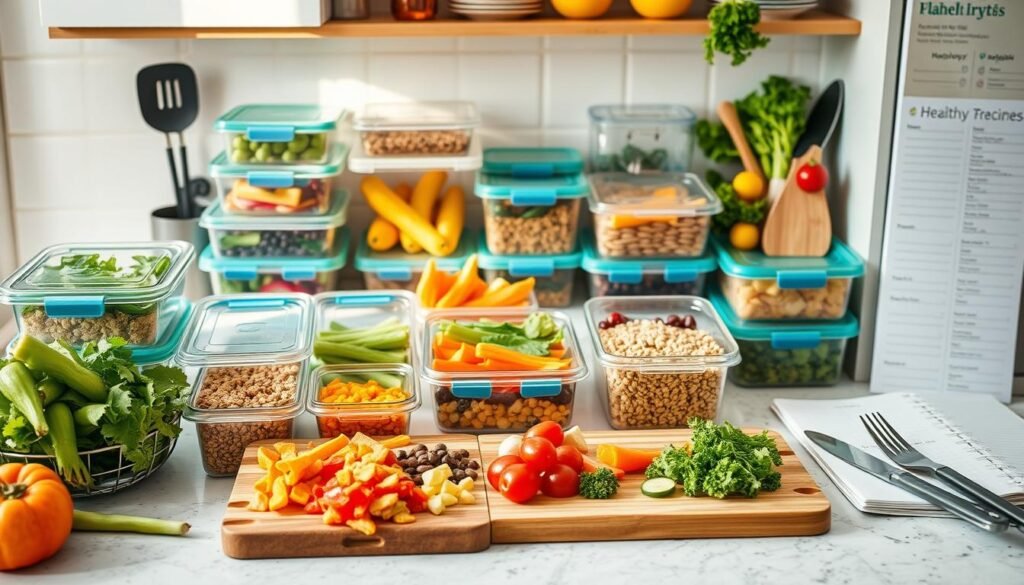
“Meal prepping has been a game-changer for me. It takes the guesswork out of my meals and helps me stay on track with my health goals.”
Meal Prep Containers and Storage
When it comes to meal prepping, having the right storage containers can make all the difference. Investing in reusable, airtight containers is key to keeping your meals fresh and your fridge organized. Look for containers that can withstand the freezer, dishwasher, and microwave for ultimate convenience.
Choosing the Right Containers
Opt for containers that come in similar sizes and shapes to make stacking and organizing a breeze. Some great options include Pyrex glass containers, Tupperware-style plastic containers, and metal bento box-style containers. These durable, versatile meal prep containers will become your new best friends in the kitchen.
Don’t forget to have smaller containers on hand for dressings, dips, and other sauces. Fold-top sandwich bags or zip-top bags can also be helpful for separating ingredients and keeping your meal prep organized.
| Container Type | Advantages | Recommended Brands |
|---|---|---|
| Glass Containers | Durable, microwave-safe, dishwasher-safe, stain-resistant | Pyrex, Snapware, Glasslock |
| Plastic Containers | Lightweight, shatterproof, versatile, affordable | Rubbermaid, Tupperware, Ziploc |
| Metal Containers | Durable, eco-friendly, leak-proof, oven-safe | LunchBots, Bentgo, Stasher |
Investing in the right meal prep containers and meal prep storage solutions can make your meal prepping journey a breeze. With the right containers, you’ll be able to keep your best meal prep containers organized and your meals fresh and delicious.
Meal Prepping Techniques
Meal prepping can be a game-changer for busy individuals who want to maintain a healthy lifestyle. There are several effective meal prep techniques to consider, each with its own set of benefits. Let’s explore some of the most popular methods that can help streamline your meal planning and preparation.
Batch Cooking
Batch cooking involves preparing large quantities of meals or components in advance, often on the weekends. This approach allows you to create multiple servings of a dish, which can then be stored and reheated throughout the week. Batch cooking saves time and ensures you always have a nutritious meal on hand, reducing the temptation to opt for less healthy options.
Individually Portioned Meals
Dividing your meals into individual portions is another efficient meal prep technique. By portioning out your food ahead of time, you can easily grab-and-go when you’re short on time. This method helps with portion control, ensures you have a balanced meal, and minimizes food waste.
Ingredient Prepping
Preparing your ingredients in advance can significantly simplify the meal assembly process. This may involve chopping vegetables, marinating proteins, or roasting vegetables and grains. By having these components ready to go, you can quickly put together nutritious meals throughout the week with minimal effort.
The level of meal prepping you choose to undertake can vary based on your schedule, preferences, and lifestyle. Some individuals may focus on prepping breakfast or lunch, while others may tackle all three meals and snacks. Experiment with different meal prep techniques to find the approach that works best for your needs and helps you achieve your efficient meal prepping goals.
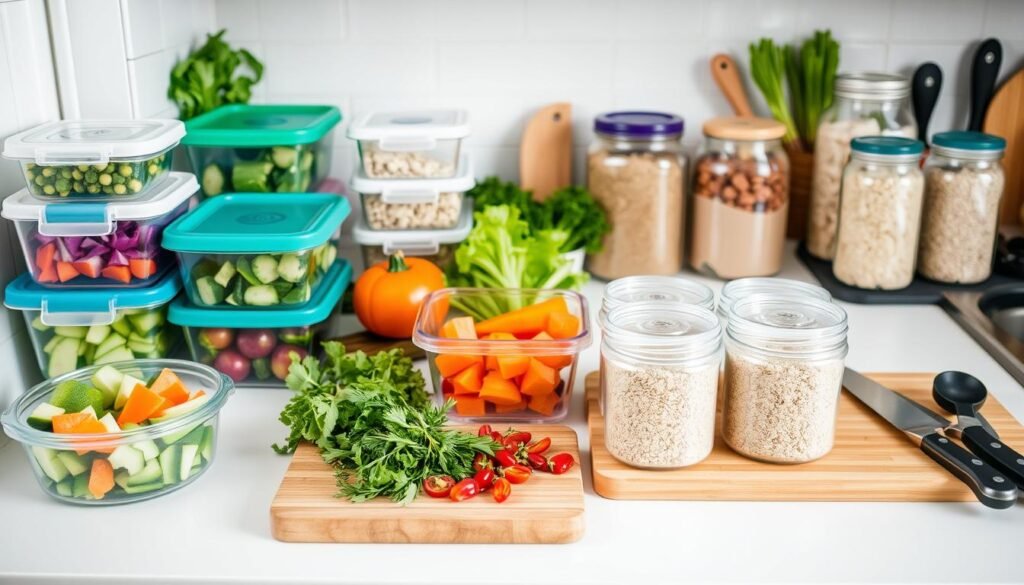
| Meal Prep Technique | Description | Benefits |
|---|---|---|
| Batch Cooking | Preparing large quantities of meals or components in advance, often on the weekends. | Saves time, ensures you have nutritious meals on hand, reduces the temptation for less healthy options. |
| Individually Portioned Meals | Dividing your meals into individual portions ahead of time. | Helps with portion control, ensures a balanced meal, minimizes food waste. |
| Ingredient Prepping | Preparing your ingredients in advance, such as chopping vegetables, marinating proteins, or roasting grains. | Simplifies the meal assembly process, saves time during the week. |
“Meal prepping is a game-changer for busy individuals who want to maintain a healthy lifestyle.”
Meal Prep Recipes
Breakfast, Lunch, and Dinner Ideas
Meal prepping can be a game-changer when it comes to maintaining a healthy lifestyle. By preparing delicious and nutritious meals in advance, you can save time, reduce stress, and stay on track with your dietary goals. Whether you’re looking for meal prep breakfast recipes, meal prep lunch ideas, or meal prep dinner recipes, there are plenty of options to explore.
For breakfast, consider make-ahead items like overnight oats, frittatas, or breakfast burritos. These dishes not only hold up well throughout the week but also provide a satisfying and energizing start to your day. When it comes to lunch, salads, grain bowls, and mason jar soups are excellent choices that are easy to assemble and pack for on-the-go.
For dinner, look for recipes that can be easily prepared in advance, such as sheet pan meals, slow cooker dishes, or one-pot pasta recipes. These meals often feature a combination of lean proteins, roasted vegetables, and whole grains, ensuring a balanced and satisfying meal.
The key to successful meal prepping is to focus on ingredients that hold up well over the week, such as cooked grains, roasted vegetables, and lean proteins. By mixing and matching these prepped components, you can create a variety of delicious and nutritious meals throughout the week, preventing meal fatigue and keeping your taste buds engaged.
“Meal prepping has been a game-changer for me. It’s not only saved me time, but it’s also helped me stay on track with my health goals. The variety of meal prep breakfast recipes, meal prep lunch ideas, and meal prep dinner recipes available makes it easy to find something to suit my tastes.”
Frequently Asked Questions
Meal prepping can be a game-changer, but it often raises a few common questions. Let’s dive into the most frequently asked questions about meal prep and provide helpful insights to ensure your meal prep journey is a smooth one.
How Long Can Meal-Prepped Foods Last?
The shelf life of meal-prepped foods can vary depending on the ingredients and storage methods. As a general rule of thumb:
- Cooked proteins like chicken, beef, or fish can last 3-5 days in the fridge.
- Vegetables and starches like rice or pasta typically last 4-6 days.
- Salads and fresh greens should be eaten within 3-4 days for best quality.
To maximize freshness, be sure to store your meal-prepped items in airtight containers and refrigerate them promptly.
What Foods Work Best for Meal Prepping?
When it comes to meal prep, certain foods work better than others. Some of the best options include:
- Lean proteins like grilled chicken, baked salmon, or roasted turkey
- Complex carbohydrates such as quinoa, brown rice, or sweet potatoes
- Hearty vegetables like roasted broccoli, sautéed spinach, or roasted Brussels sprouts
- Healthy fats like avocado, nuts, or olive oil
These ingredients not only hold up well during meal prep but also provide a balanced and nutritious foundation for your meals.
Tips for Beginner Meal Preppers
If you’re new to the world of meal prepping, here are a few tips to help you get started:
- Start small and focus on one or two meals at a time
- Invest in high-quality meal prep containers to ensure freshness
- Batch cook staples like grains, proteins, and roasted vegetables
- Experiment with different flavors and cuisines to keep your meals interesting
- Involve the whole family in the meal prep process for a collaborative experience
Remember, the key to successful meal prep troubleshooting is finding what works best for your lifestyle and preferences. Don’t be afraid to try new things and find your own rhythm.
Conclusion
As we’ve explored, meal prepping is a fantastic way to save time, money, and simplify the process of eating healthy, even on the busiest of weeknights. By understanding the benefits of meal prep, investing in the right storage containers, and trying out various techniques and recipes, you can set yourself up for success. Start small, focus on foods that hold up well, and don’t be afraid to experiment to find what works best for your lifestyle and preferences.
Meal prepping may take some initial effort, but the payoff of having nourishing, home-cooked meals ready to go is well worth it. With a few simple meal prep tips under your belt, you’re on your way to streamlining your routine and setting yourself up for healthier, more fulfilling meals. The next steps for meal prepping are to continue exploring recipes, experimenting with new techniques, and finding what works best for your unique situation.
Remember, the key to successful meal prepping is to make it work for you. Embrace the process, have fun with it, and enjoy the time-saving, money-saving, and health-boosting benefits that come with a well-planned meal prep routine.

